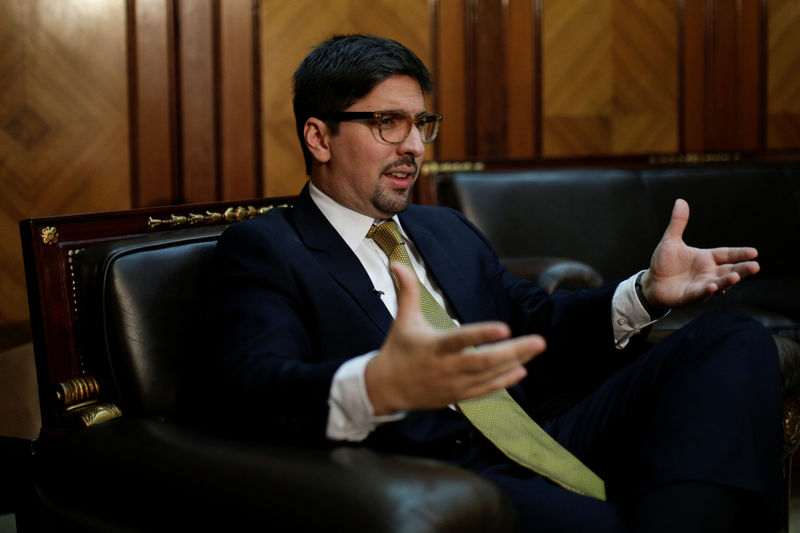By Andrew Cawthorne
CARACAS (Reuters) - Visitors to the headquarters of Venezuela's Popular Will party are greeted by large photos of global political heroes from Nelson Mandela to Mahatma Gandhi.
Facing them is a life-size cardboard cutout of imprisoned party founder Leopoldo Lopez, fist raised in defiance.
The intended message is clear: like other revered opponents of repression, Popular Will is leading the fight against tyranny in socialist-ruled Venezuela, and suffering the most for that.
President Nicolas Maduro, however, has a different narrative: the party, launched in a provincial sports stadium in 2009, is a well-financed puppet of U.S. policy harbouring violent coup-plotters intent on bringing him down.
Even some more moderate allies in the opposition coalition are sceptical of Popular Will, viewing its confrontational street tactics - from hunger-strikes to marches - as too hotheaded.
Maduro this month created a new unit, the "Anti-Coup Commando", which has the orange-branded party in its sights.
"There is one organisation in particular that doesn't deserve the name political party, an organisation forged in the shadow of terrorism and violent actions: Popular Will," said Vice-President Tareck El Aissami who heads it.
In its first few days, the unit arrested four party members.
A local substitute lawmaker and his girlfriend visiting from abroad were stopped at a roadblock and accused of carrying arms - which the party says were planted on them - while two other regional activists were also rounded up for alleged coup plans.
That took to 13 the number of party activists behind bars, the largest of any opposition group, in what critics say is a wave of repression intended to keep Maduro in power despite his unpopularity and a brutal economic crisis.
Despairing of last year's failure to bring about a referendum to recall Maduro and believing it is up against a dictatorship, Popular Will is now advocating civil disobedience while other opposition parties still push for a new vote.
"The dictatorship has made this country unlivable for the people, so the people have to make it unlivable for them," said Freddy Guevara, 30, an ex-student leader who leads Popular Will in the absence of Lopez.
"That means mobilizations, marches, concentrations, downing of tools, sit-downs, hunger-strikes, refusal to pay taxes," Guevara told Reuters at a cafe even as El Aissami denounced him as a "terrorist" on TV screens nearby.
"STUCK WITH MADURO"?
Appetite for Gandhi-like civil disobedience within the opposition coalition - where Popular Will is the third party by number of lawmakers - appears lukewarm however.
The party commands strong support among young opposition supporters who see it as more courageous than others.
But its 2014 "Exit" campaign - when protests landed Lopez in jail, sparked violence killing 43 people and allowed Maduro to unite factions against a common enemy - alienated opposition moderates and failed to rally the poor.
"It was a fatal mistake which set us back years," said a prominent opposition figure, asking not to be named for fear of unsettling relations within the coalition.
New protests last year - with wider opposition support - were just gaining momentum when the coalition controversially entered a dialogue with the government.
The rallies stopped, and the talks, which Popular Will had declined to participate in, soon failed.
"I think we're stuck with Maduro now until 2019. If all the opposition had rallied behind Leopoldo's calls, Maduro would be gone, but other leaders went soft," said Griebel Mendoza, 22, a student and former marcher now trying to catch up on studies.
Maduro, 54, a former bus driver and foreign minister, narrowly won election after his mentor and predecessor Hugo Chavez's death from cancer in 2013. But his ratings have plummeted amid the OPEC nation's three-year recession.
According to rights groups, the government holds more than 100 political prisoners - up from 11 at the end of Chavez's rule - though officials say all are in jail legitimately for crimes.
Venezuela's next presidential election is due at the end of 2018, but Popular Will fears Maduro will tilt the playing field by outlawing their party, and keeping Lopez - a potential presidential candidate - in jail.
Another possible opposition candidate Henrique Capriles, of the larger Justice First Party, could also be taken out of the running if authorities push corruption allegations against him. Capriles, who narrowly lost to Maduro in 2013 and has a long-running rivalry with Lopez, says the allegations are made up.
"Their plan is to be like Nicaragua," said Guevara, referring to the leftist Sandinistas' latest presidential win in late 2016 amid accusations of neutering the opposition.
Among the two dozen or so opposition groups in the anti-Maduro coalition, Popular Will has the slickest operation, with well-oiled publicity channels, plenty of powerful friends abroad and a telegenic face in Lopez's wife Lilian Tintori, a former kitesurf champion turned rights activist.
All that fuels government accusations it is a channel for U.S. meddling in Venezuela. And while Popular Will defines itself as "progressive" - akin to former British leader Tony Blair's "Third Way" according to Guevara - officials blast it daily as "fascist" and "ultra-right".
"They spend hours and hours vilifying us, but support for the party rises," Guevara said, smiling.

"It's logical. If the whole country hates Maduro, and Maduro hates us, then the people are going to love us!"